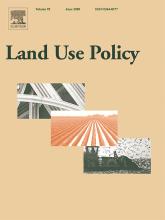Resource information
Forestry policy and practice in Britain has been subject to a series of paradigm changes since the establishment of the Forestry Commission in 1919. Drawing on a documentary analysis of legislation, published policy statements, commentaries and scholarly critiques, this paper argues that British forestry policy has undergone three significant paradigm shifts since it was first mooted in the late 19th century. With origins in a largely ad hoc and laissez-faire attitude towards forest expansion and management which dominated up to World War I, a productivist stance based on intensive mono-culture plantations in order to reduce import dependence then held sway until the early 1970s. This has since been overlain with ideas about multi-functionality and sustainability that continue to be important today. The new ecosystem approach (and its specific emphasis on the provision of ecosystem services) can arguably be viewed as an emerging new forestry paradigm era in which ideas of resilience and sustainability are to the fore. It is suggested in conclusion that while the policy and practice of forestry in Britain continues to mirror broader shifts in environmental governance within the country, these in turn are increasingly influenced by international debates and obligations.


